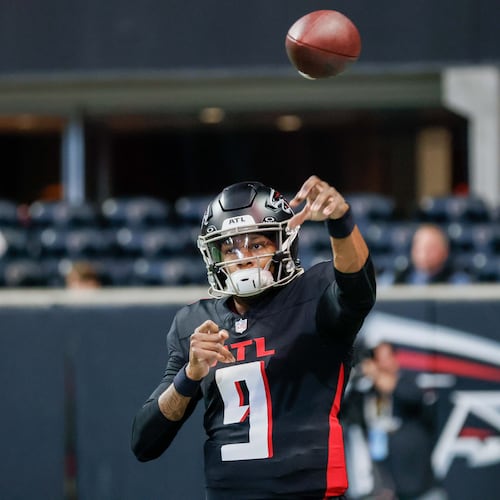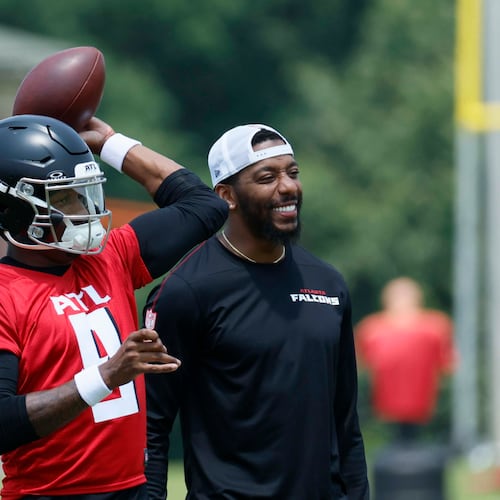Some of the worst moments in Super Bowl history didn’t even happen on the field.
Stanley Wilson’s white powder; Barret Robbins’ disappearance and, in a moment that still burns Falcons’ fans, Eugene Robinson’s late-night sexual walkabout.
All three occurred in the days before the game, when the Super Bowl-sized media obligations, long-lost friends and family reappearing, strange hotels, strange fields and strange routines combine to pull players and coaches in a thousand directions. The 49ers and Ravens — with fewer than 10 players on either roster with Super Bowl experience — are encountering these things as they head toward Sunday’s game in New Orleans.
“It’s not so much the pressure, it’s the distractions,” former Falcons coach Dan Reeves said.
Reeves would know. He has participated in a record nine Super Bowls, including the Falcons’ only appearance in 1999 in Miami.
“It’s a tough two weeks,” he said. “There are so many things that have nothing to do with the game that you don’t have to deal with (during the regular season). The Super Bowl isn’t for the players. It’s for the advertisers and everything.”
It’s difficult to comprehend how the biggest game in the history of a franchise and the often short career of a player can be undermined by the superfluous. But that’s exactly why some players can’t handle the pressure.
The enormity of the “once-in-a-lifetime” situation can lead them to make poor choices because they are trying to regain some sense of control in an unfamiliar situation, according to Atlanta-based sports psychologist Dr. Rick Van Haveren.
“If you want to create a lot of pressure for yourself, you can,” he said. “Some athletes do that. (They’ve) Created so much pressure it leads to performance anxiety.”
He said that sometimes drugs and sex are used as ways to reduce stress.
Robinson declined to talk about any aspect of his arrest for soliciting a prostitute, who turned out to be an undercover police officer, in south Florida the night before the game. He previously told 92.9FM that he “lost focus and let lustfulness inside of” him.
Reeves and Robinson have called the arrest a “huge distraction.”
The next day was a disaster for Robinson and the Falcons.
Robinson misread a play in the second quarter that allowed John Elway to hit Rod Smith for an 80-yard touchdown. The Broncos used the momentum from that big play to defeat the Falcons, 34-19.
Robinson, who now is analyst for the Panthers, told 92.9FM that he has tried to apologize to his former teammates because he “felt like the worst person on earth.
“I’ve experienced Super Bowls and thought that was a winnable game because of the team we had, the defense we had, the offense we had. I was like, ‘dang it, man, you let your avarice and your greed supplant what you’ve been doing all this year because you know that we can bring a Super Bowl here to Atlanta.’ That’s where I really felt the hurt and the pain.”
Robinson isn’t alone in reacquainting himself with the demons.
Wilson, once a running back for Cincinnati, relapsed before the Super Bowl against San Francisco in 1989. A coach found him sitting in a bathtub the night before the game, high on cocaine, according to the Cincinnati Enquirer. There was still powder on Wilson’s nose and lip. He didn’t play the next day and was kicked out of the NFL.
Sometimes the pressure, or the distractions, may affect players in ways that don’t always involve choices such as sex or hard drugs.
Robbins was a Pro Bowl center for the Raiders in 2002. Oakland chewed through the AFC, culminating in a meeting with Tampa Bay in the Super Bowl in 2003. Similar to Wilson, in the days before the game, Robbins disappeared.
Robbins had a history of depression and Oakland coach Bill Callahan later said that Robbins told him he had stopped taking his medication. It was reported that Robbins went on a drinking binge in Tijuana the day before the game.
“He was crying and totally depressed about his life and the pressure he was under,” said Cartier Dise, who told the San Francisco Chronicle that he was in a group that drank with Robbins.
“This guy was messed up. All he could think about was his family, his two daughters. He was talking about killing himself, saying he was disappointing people and he had a lot of people to support financially and he was letting them all down.”
Robbins missed the game and the Raiders were drilled, 48-21. He was later diagnosed as having bi-polar disorder. He returned to the NFL but was released by Oakland in 2004. He was arrested in 2005 after a fight with several police officers in Miami that resulted in him being shot several times. He was sentenced to five years of probation. He was arrested again in 2010 after a Dallas police officer found crack cocaine in his car. He was released from prison in September.
Those are three extreme examples of how Super Bowl week can negatively affect players.
If that’s the bad, how do some players shine?
It depends upon how they handle the changes, which are numerous for athletes and coaches who thrive on consistency and focus.
The weekly media obligations are magnified as hundreds of journalists from around the world descend on the teams with many questions focused on the enormity of the game. No matter how hard the coaches try, weekly routines must be tweaked at the least, blown up at the worst.
The requests and questions aren’t just reserved for the media. Reeves said coaches and players will suddenly hear from people that they haven’t heard from in years who will ask for tickets, which is yet another difference from the normal weeks. Some players will appoint someone to decide who gets tickets so that they don’t have to deal with saying “No.” There are also the myriad social engagements and other logistical issues that can take up time and create distractions. The week of the game, the team will be forced to live in strange hotel rooms and practice on strange fields and use strange locker rooms. More differences.
Once the players get through all of that, and make it to game day, that routine is also changed. The game slows down as the dozens of commercials, costing an estimated $4 million for a 30-second spot for this year’s game, are played to an estimated viewership of more than 100 million people.
Based upon his results, former Giants quarterback Phil Simms apparently figured out a way to handle the distractions and strangness.
Simms, now an analyst for CBS, led the Giants to a 39-20 win over Reeves’ Broncos in 1987. In doing so, Simms had one of the best performances of any player in any game, completing 22 of his 25 passes – a Super Bowl record – and three touchdowns.
Simms said he was fortunate that coach Bill Parcells repeatedly told him forget about all the distractions and pressure. “I think it is a little bit different in the Super Bowl, so you have to prep yourself mentally for when the game does come around,” Simms said.
Because there will be gigabytes of video posted from every interview this week, fans can listen and watch and perhaps tell for themselves which players are handling the distractions and the pressure better than others.
Dr. Van Haveren said the players that are comfortable will likely come across as confident. Simple things like laughter, or even whistling, are good signs.
Players who drop their heads or stumble over the words may be uncomfortable.
Once the game starts, making mistakes on what are normally ingrained behaviors, such as not staying onside or short-arming throws, can indicate nerves.
But in the end, the Super Bowl is important, but it is just a game.
“It’s just football,” Robinson said. “You have to treat it that way. Don’t put any more pressure on yourself. Don’t make it anything more than it is. The journey, trying to get there, is the biggest thing.”
About the Author
Keep Reading
The Latest
Featured



